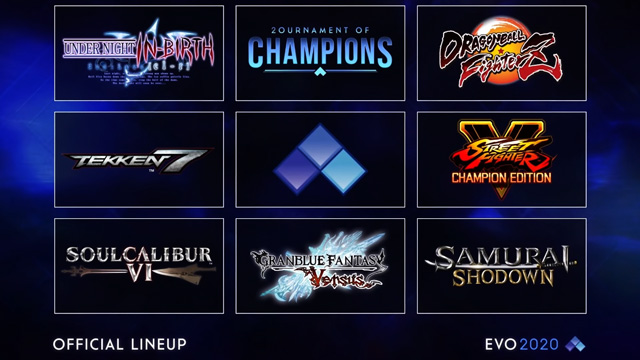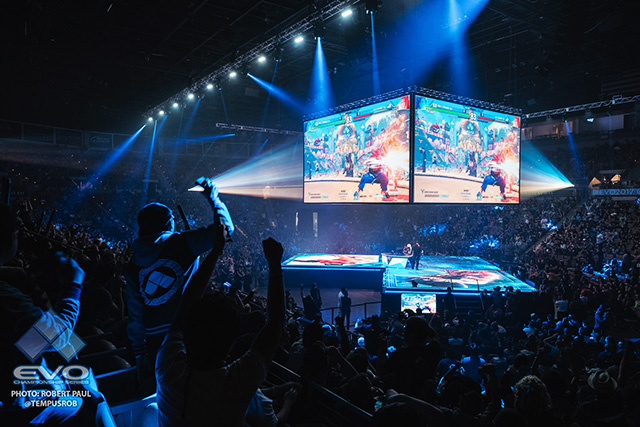By David Acevedo
The Evolution (EVO) Championship Series is the biggest annual fighting game tournament and is widely known amongst the FGC (fighting game community) to be the most important one, because it has the most number of entrants of any yearly tournament. This year the series has been cancelled due to COVID-19 concerns.
The tournament tends to be the biggest paying tourney (depending on the game). Just last year, the top 8 prize pool for Street Fighter V: Arcade Edition, explain what that is, was a whopping $69,510. In addition, the tourney is also seen as a proving ground for those seeking to maintain their title as the best players (of a specific game), potentially gain the title, or otherwise make a name for themselves.
In its place, the EVO team announced EVO Online, transitioning the tournament to an online format. The yearly EVO tournaments are normally held in Mandalay Bay on the Las Vegas Strip in Paradise, Nevada. EVO attracts thousands of professional players and enthusiasts alike and the transition to online has many people within the FGC worried.
Before any further details about EVO Online were released, much of the FGC were worried about how the event would turn out. This is because it was assumed that the same games that made up the EVO 2020 lineup (Dragon Ball FighterZ, Tekken 7, Street Fighter V Champion Edition, Samurai Shodown, Super Smash Bros Ultimate, Soulcalibur VI, Granblue Fantasy Versus and Under Night In-Birth Exe: Late) would be present for EVO Online.
The netcode (or the code that relays what is happening mid game from one player to another while playing online) of these games is known for having many connectivity issues between players. This led to much of the FGC ridiculing this decision due to the very probable scenarios involving lag (or the delay of network information relayed from player to player) between players that can cause all kinds of goofy and frustrating scenarios that will end up ruining much if not all of the competitiveness of the tournament itself.
However, because EVO Online is being treated as a separate sub series than EVO 2020, the original lineup received a bit of an overhaul. Most of the games in the original 2020 lineup stayed with the exception Super Smash Brothers Ultimate and four other games were added in its place. These games are: Mortal Kombat 11: Aftermath, Killer Instinct, Skullgirls, and the new Them’s Fightin Herds. Unlike the games that make up EVO 2020’s original lineup, these new games are known for having a different kind of netcode that makes them more reliable and there is a lot of speculation over the removal of Smash Ultimate, most them tying back to the innumerable amount of online connectivity issues the game suffers from even when compared to the rest of the original lineup (since none of them are really known for having good online connectivity).
There are two common types of netcodes that fighting games use, referred to as either delay-based or rollback, and some games even have a combination of the two. Generally, delay-based is the most common kind of netcode but rollback is usually known as the more stable one. The games that were recently added to EVO 2020’s online lineup either use rollback or a combination of delay-based and rollback both of which lead to more stability than plain delay-based.
Delay-based netcode is a type of netcode that sets a delay (in frames) at the beginning of a match that is determined by ping (the time it takes your information to be sent to a server or another player in milliseconds). The lower the delay, the faster both players response time will be within the game. However, this delay can change mid game which means if a player’s internet connection slows down while a match is underway (commonly known as a lag spike) then the delay will rise and delays past a certain point slow down the game visually and can even pause the game entirely. In addition, because these delays influence the players reactions and button timings, they will end up playing significantly worse because it is very unlikely that they would have practiced under these delays, if at all even possible to do so and it is unlikely that they would do so since in-person tournaments (which is what they are usually accustomed to) have no delays.
Rollback netcode is known to be the better netcode type because it handles network instabilities better than delay-based. If a player is losing connection, rather than set a delay before the information is sent to a server or other player (like in delay-based) the game will assume your inputs and then “rollback” or correct itself once it properly receives information again. However, this does not come without any downsides. The downside is that if the rollback is particularly bad, then it will create gameplay inconsistencies that can change the flow of a match for worse.

Many within the FGC were actually excited to see what kind of catastrophe EVO Online would end up as. One such individual is Cameron “Trashcan” Williams, a Georgian Soul Calibur VI player whose most notable placing was in Momocon 2019 where he finished in 9th place. “I don’t want to see EVO Online fail, I want to see it struggle. It’s well known that the developers of these games watch these tournaments and maybe them seeing the network problems will sort of open their eyes and entice them to fix the netcode issues in their games.”
Trashcan is convinced that better netcodes in fighting games will help improve the community skill-wise because players will be more enticed to take the game seriously.“Pro-players would love to use the online platform as a way to get some serious practice but doing so isn’t practical because of netcode issues, so we have to resort to practicing with other players in person which is especially hard to do with everything going on right now.”
The transition to an online format has been met with both ridicule and bewilderment from the FGC. The general consensus is that EVO online is going to be a catastrophe and perhaps some of these concerns reached the EVO team hence why they added four games known for having good netcodes and removing the game known for having the worst. Even then, all of the games that made up the original 2020 lineup all use delay based netcode and are not known for having good netcode to begin with. How EVO online will turn out is really still up in the air, but at the very least, there are precautions being put in place to address the (still largely) inevitable connectivity issues.



